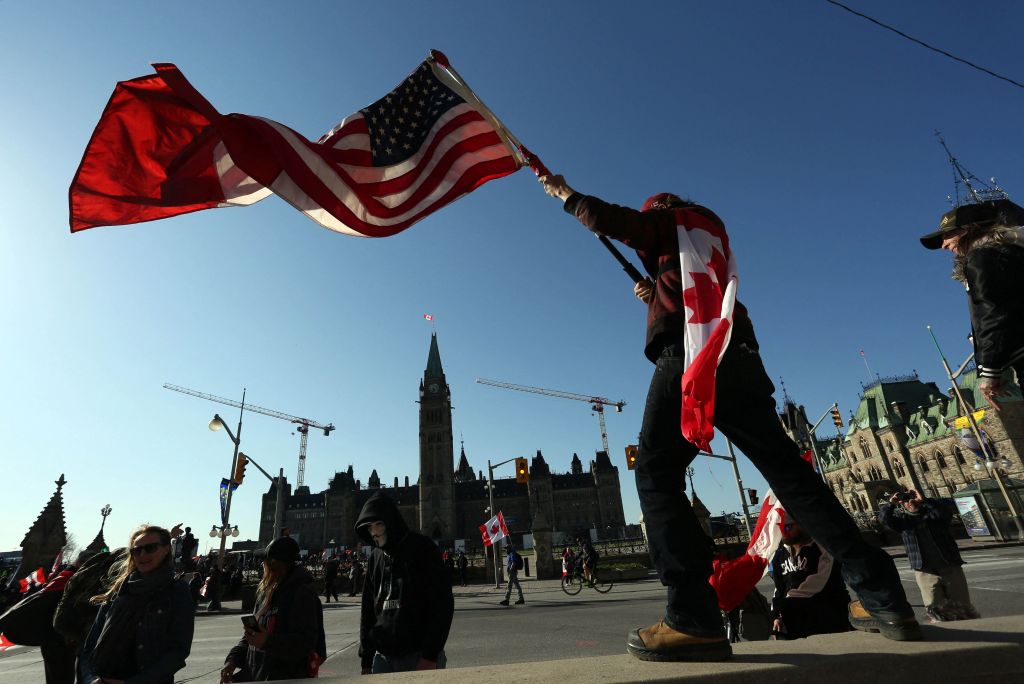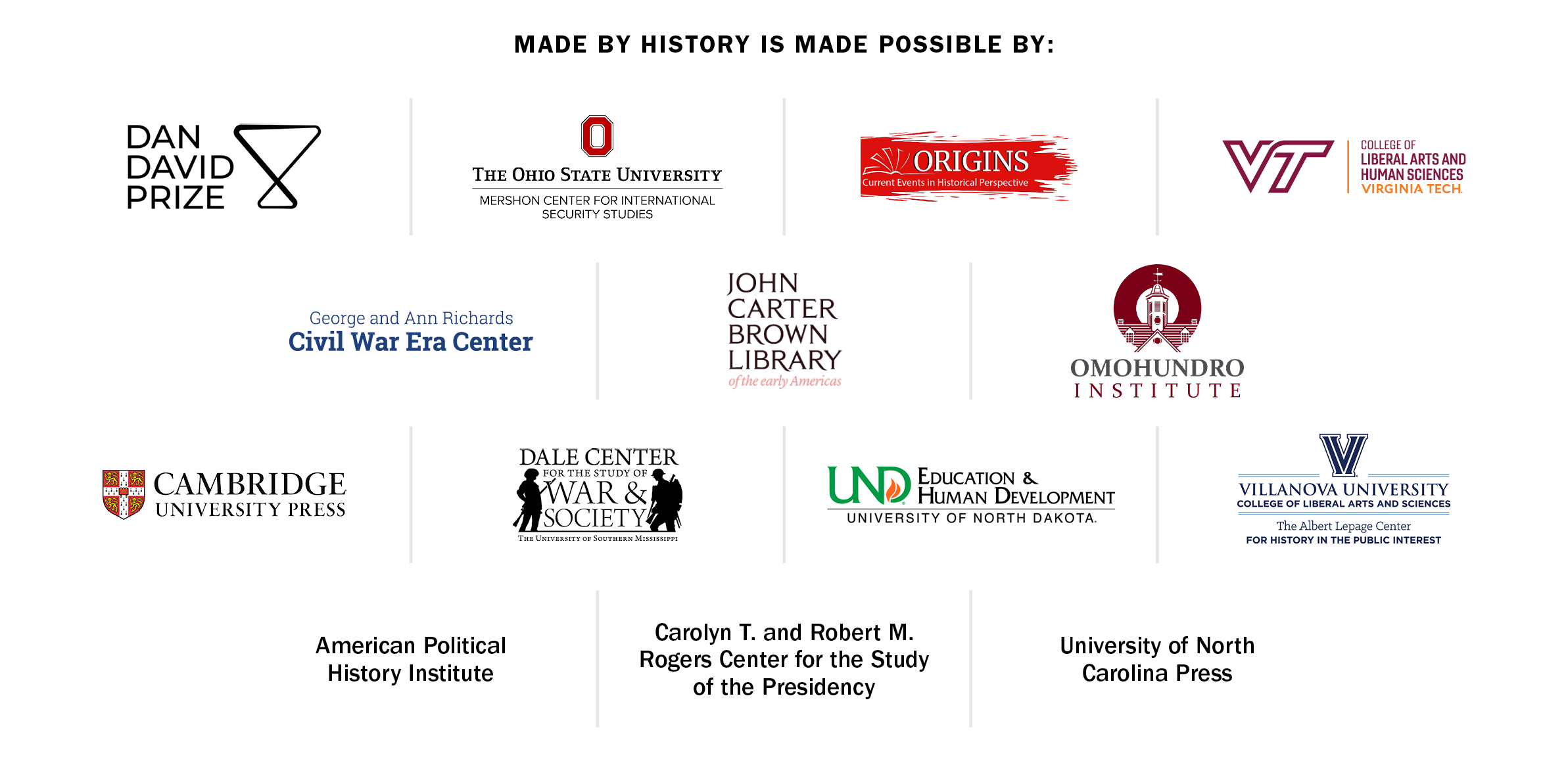
In late January, Tucker Carlson visited Canada, meeting with influential Canadian politicians and political commentators. Speaking at an event hosted by Alberta premier Danielle Smith, he mocked Canadian Prime Minister Justin Trudeau in front of thousands of Canadian spectators. But why did a media personality known for courting the far right in the U.S. visit Canada to comment on its politics? And why did he have such a strong support base there?
Canada and the United States have different forms of government but close political ties. But for decades, U.S. commentators have struggled to parse out the ideological differences, for example, between Canadian Liberals and Conservatives, as they don’t align with the ideological differences between U.S. Democrats and Republicans.
Since the 1980s, though, the right in the United States and Canada has worked to strengthen its relationship. More recently, far-right groups in both countries have found common ideological ground that helps empower right-wing leaders and supporters in both countries.
In the mid-20th century, Canadian political leaders worked to create a national identity that was independent of Britain and the United States. Canadian conservativism had long defined itself in opposition to the United States and its imperialism, while the Liberal Party had traditionally encouraged economic integration and cooperation between the two countries.
Read More: Tucker Carlson to Bring New Show to Twitter
That changed when nationalist movements in English Canada in the 1960s broke from this tradition, and Liberal leaders also worked to craft an identity in opposition to their southern neighbor. They criticized the imperialism and racism in the United States that they claimed did not exist in Canada and encouraged economic distancing between the two.
Just as Canadians were forging a new sense of national identity, Americans became more interested in Canada’s internal politics. Liberal Pierre Trudeau was elected as Canada’s Prime Minister in April 1968 and became the country’s first leader to reach a “celebrity” status outside the country.
But Trudeau encouraged distancing Canada from the United States, not just in ideology, but in economic ties. While the U.S. had an embargo against Cuba following the Cuban Revolution, for instance, Trudeau strengthened ties between the country and Canada, declaring “Long live Cuba and the Cuban people, long live Commander Fidel Castro.”
Yet it was not his socially progressive policies, economic partners, or even romantic partners (he briefly dated Barbra Streisand, 23 years his junior) that got the most U.S. attention. In October 1970, Trudeau made headlines across the world after he gave the federal government the power to suspend civil liberties under the War Measures Act for the first time in peacetime. Under this Act, Trudeau declared a state of “apprehended insurrection” in Quebec after Members of the Front de libération du Québec (FLQ) kidnapped the deputy premier of Quebec and a British diplomat, and after hundreds of bombings and robberies around the province that left six people dead.
Read More: Trudeau’s Use of Emergency Law to Quell Protests Provokes Confusion and Criticism
Major U.S. media outlets reported on the crisis. In December 1970, the New York Times published a multipage interview with Trudeau, attempting to understand how a socially progressive leader like Trudeau could take such action. As the subheading for the interview asked, “Did Canada’s notably cool Prime Minister overreact to the threat of a miniscule Quebec terrorist underground?” The U.S. media struggled to reconcile Trudeau’s image as a progressive liberal leader with his actions under the War Measures Act.
As those on the U.S. and Canadian left struggled to find common ground, the 1980s saw closer ties between the Canadian and U.S. right. When Canadians voted conservatives into power in Parliament in 1979, it resulted in the first Liberal defeat in 16 years. Though Trudeau served as Prime Minister for another term after this, the 1984 election of Brian Mulroney resulted in Canadian conservatives embracing policies that were further right, growing closer to the ideology of the right in the United States.
In a reverse strategy of decades past, Mulroney aimed to strengthen the relationship between the two countries and raise awareness of Canadian politics in U.S. media. Just months before the 1984 Canadian federal election, President Reagan even invited him to the White House, holding a joint press conference despite the Liberals still being the party in power in Canada at the time. Just as Mulroney hoped, Americans were paying attention to Canadian politics, and he was able to forge closer relations with the United States. Mulroney worked closely with Reagan’s successor, President George H. W. Bush, even giving a eulogy at his funeral in 2018.
But as Mulroney’s government worked closely with U.S. Republicans, they still remained ideologically distant on many issues. Mulroney, for instance, drew criticism from Reagan for imposing sanctions against South Africa during apartheid. But in the 1990s and early 2000s, conservatives in Canada—and particularly conservative leaders in Alberta—pushed the Progressive Conservative Party further right. In 2003 it joined with another conservative party, creating what is now the Conservative Party of Canada.
As politicians on the right in the United States and Canada worked to strengthen diplomatic relations between the two countries, far-right activists and organizations have also strengthened cross-border ties. Ben Klassen, for instance, was raised in Canada, but founded the Church of the Creator—a white supremacist church—once he moved to the U.S. Gavin McInnes, the founder of the Proud Boys, moved from Canada to the U.S. in 2001, when he began to embrace far-right ideology.
Now, as the Canadian far right has gained more power domestically, these connections have deepened. In 2022, a trucker convoy took over the downtown of Canada’s capital, Ottawa, to protest the vaccine mandate for truck drivers crossing the Canada-U.S. border. The trucker convoy itself seemed to signal how the ideologies of the U.S. and Canadian right had converged.
Read More: Canada's Capital Declares a State of Emergency After Anti-Vax Protests Spin ‘Out of Control’
It also strengthened financial ties between far-right conservatives in both countries. Many who donated to the trucker convoy through crowdfunding websites had U.S. addresses. When GoFundMe took down the convoy’s donation page, U.S. Republicans such as Ron DeSantis and Jeff Landry protested the move, demanding immediate refunds to U.S. donors. In a sample of a 12-hour period, where donations totaled over half a million dollars, one news agency estimated that over half of identifiable donations came from south of the border.
In this way and others, the far right in the United States is helping to empower the far right in Canada. The ideological gap between the Liberals and Conservatives in Canada is growing larger as the far right gains more influence in the Conservative Party. All the while, despite significant differences (such as their positions on abortion and gun control), the Conservative and U.S. Republican Parties grow closer together, a move that is being championed by the far right on both sides of the border.

A week after Tucker Carlson’s visit, Conservative Premier Smith’s government banned gender-affirming care for children under the age of 15 in the province of Alberta. Prime Minister Trudeau observed that “the most anti-LGBT policies of anywhere in the country” had passed one week after Carlson visited the province, condemning Premier Smith’s decision. In fact, the Liberal Party frequently compares the Conservative Party to Republicans, even claiming the Conservatives are embracing “MAGA” policies.
The United States and Canada share the world’s longest international border. Their histories and futures are intertwined, and their governments have worked to have close diplomatic ties. But as voters in both countries prepare to go to the polls in the next few years, they would do well to focus on domestic issues, rather than use the other country’s politics as a means to empower their own— and be wary of those who try to do so.
Tess Megginson is a Ph.D. candidate in history at the University of North Carolina at Chapel Hill.
Made by History takes readers beyond the headlines with articles written and edited by professional historians. Learn more about Made by History at TIME here. Opinions expressed do not necessarily reflect the views of TIME editors.
More Must-Reads from TIME
- Cybersecurity Experts Are Sounding the Alarm on DOGE
- Meet the 2025 Women of the Year
- The Harsh Truth About Disability Inclusion
- Why Do More Young Adults Have Cancer?
- Colman Domingo Leads With Radical Love
- How to Get Better at Doing Things Alone
- Michelle Zauner Stares Down the Darkness
Write to Tess Megginson / Made by History at madebyhistory@time.com
